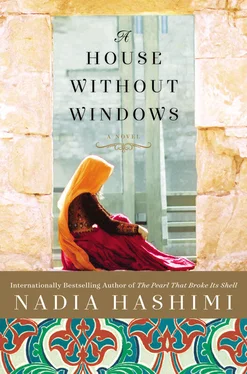Zeba had only nodded, knowing she would not see her husband’s sister again. Kamal was buried beneath two meters of earth and with him was buried everything Tamina wanted to forget. This was her chance to do so, and she would not squander it.
Tamina had turned to slip back into the street when she paused and, without turning, said: “I’m glad for the children, Zeba. You didn’t deserve to die.”
Zeba, her arms still tightly wrapped around her daughters, her cheek pressed against the top of her son’s head, had sobbed loudly and fallen to her knees.
ZEBA HAD SPENT THE FALL AND WINTER AT HOME WITH HER children. Her grandfather, Safatullah, had given her ownership of a plot of land the family had leased to farmers. The rent payments she received were not much, but they were enough to sustain a small family. They’d seldom left the house during the three-month school winter break. Zeba used the time to recover. She’d opened the windows of her home to air out the stench of rotted food and vacancy. She’d raked over the dirt in the courtyard, though Kamal’s blood has been washed away by the heavy rains that had fallen while she was in Chil Mahtab. She cut away the dead branches of the rosebush and let her fingers linger in the softened earth beneath it.
Inside, Zeba swept the floors and washed every pot, pan, and glass in boiled well water. She did so in peace, noticing as she wiped down the walls of their living room that she did not sense the blackness. It had disappeared just as furtively as it had entered. In the room she had shared with Kamal for seventeen years, Zeba separated her husband’s clothing from her own, holding his shirts and pants at arm’s length. She folded each piece and stacked them in the center of an old bedsheet, tying the ends of the sheet into a tight knot. On the coldest days of winter, she’d opened the bundle and used his tunics and hats as fuel for the cooking fires, stoking the flames with a twinge of satisfaction.
The children did not speak of their father. They did not need an explanation, having known what their father was in life. That he was no longer part of their world did not trouble them. They would not miss his violent outbursts, the way he would leap at their mother’s cowering form. Their ears still burned under his twisting fingers, their cheeks still stung from his slaps. They did not miss the sound of breaking glass or the anxiety that sent a stream of urine running down their legs in the middle of the night. It was better and fair that he was gone and their mother was returned.
Let justice find its rightful owner, the judge had said. It was a truth her children had understood without hearing the fable. The jurisprudence of a child astounded Zeba.
It was spring now. Frigid temperatures were giving way to milder days. The palette of the world outside shifted, a spin of the color wheel. Yellow turned to green and gray turned to blue. The snowcaps of the mountain receded. The river waters ran cold and fresh, a new generation of fish filling its beds. It was time for her family to reenter the world, Zeba decided. Should the villagers gawk and stare, so be it. Should they point fingers and whisper or shout, it would not matter. She had not left Chil Mahtab only to make her children prisoners of their own home.
Rima’s small fingers, the soft pad of her palm, fit snugly into Zeba’s right hand. Basir carried a black plastic bag they would use to bring back fish from the river. Zeba followed her children, her chest bursting to see them in the warm sunlight. Basir, Shabnam, and Kareema were a few meters ahead of her, close enough that she could see their profiles when one turned to laugh at something another had said.
Kareema stopped abruptly, turned, and called back to her mother.
“Do you promise we will see Bibi- jan tomorrow?”
“Yes,” Zeba nodded. “We’ll leave in the morning to go to your uncle’s home. We’ll have to bathe well, though, so we don’t stink of fish when they hug us.”
Kareema burst into laughter and hopped a few steps to catch up with her siblings.
These are my children, Zeba thought to herself. Look at those brilliant faces, the way their arms swing as they walk, the way they nudge one another with a playful shoulder. There’s no part of the devil in them. They are mine.
Gulnaz would be waiting for them, as would Rafi and his wife. Without Kamal to spoil things between them, Zeba felt like she’d been returned to her childhood. Knowing the truth about their father had freed Rafi and Zeba to love their mother more completely, for they could finally understand her as a whole person. They didn’t need their father’s explanations nor did they have much desire to be part of his life. It was enough to know he was there, not a martyr, but not the devil, either.
Many of the villagers had come to the river, enough that the sight of them made Zeba hesitate for a second. She considered calling the children back and turning around, promising them to come another day. But then she thought of the women she’d left behind at Chil Mahtab. She thought of Latifa and Nafisa, Bibi Shireen and the young woman with the twin boys. She remembered that they’d called her Malika Zeba and burned her name onto their bodies.
We are so happy for you, they’d cried the day she was freed. Pray for us, Malika Zeba. You know no one else will.
They’d rejoiced in her release because that, too, gave them strength. If a murderess could be set free, there was some hope for the rest of them.
Bolstered by their voices that echoed still in her head, Zeba lifted her chin and pushed forward, nearing the villagers she’d avoided for two seasons. Boys laughed, carrying sticks strung with trout, their silvery-green skins dotted with red. A family was flash-frying the fish by the side of the river, just feet away from the stones where small children sat perched, dipping their fingers into the icy waters and shivering.
Zeba settled on a flat area, not far from where the river took a gentle bend. They were close enough to others that she could make out their faces but far enough away that she could not make out their words. She spread out the bedsheet she’d brought and they sat, cross-legged, while Basir went off to try the fishing net he’d borrowed from a neighbor. Shabnam and Kareema brought jacks and began their quiet game, bouncing the ball and deftly grabbing the silver spiders from the ground. Rima giggled each time they softly batted her meddling hands away.
The river water shimmered in the afternoon sun, and Zeba put a hand to her forehead to shield her eyes from the glare. She looked for Basir’s silhouette and found him amid a group of boys his age. While some stood on a cluster of rocks, Basir and a few others had sloshed into the waters with knees high, dragging their nets.
Zeba heard a rustling behind her, and her head swiveled instinctively. Seeing a mother and father making their way back home with a young girl walking between them, she turned her attention back to her daughters.
She had leaned over to brush Shabnam’s hair from her eyes when she suddenly felt her breath catch in her chest. She turned once more, slowly, half hoping the family would not notice her and half hoping they would. There were people around them, but no one paid them much mind, as if Zeba and her children were the most ordinary people.
The wife was speaking to her husband who nodded. The little girl’s hand was clasped in her mother’s. They were coming closer and would soon pass Zeba and her three daughters. Zeba lowered her gaze and felt her eyes mist. She blinked but could not look away. What a beautiful girl she was — just as lovely as the three who sat before her.
The girl’s slender frame came in and out of view, half hidden by her father’s form. He looked to be a good man, Zeba thought, a wave of peace washing over her. He looked to be the kind of man who knew right from wrong, the way he walked with his wife and daughter and not ahead of them.
Читать дальше











